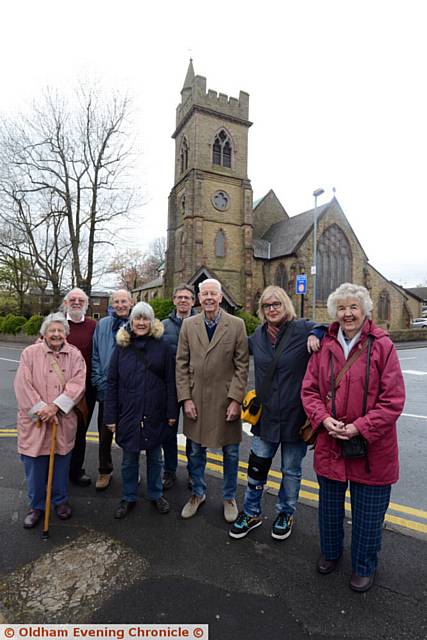Family follows in the footsteps of Alfred
Reporter: Karen Doherty
Date published: 11 May 2017
DESCENDANTS of a wealthy Victorian cotton mill owner and philanthropist found out more about his life during a visit to Oldham.
They were given a tour of places associated with Alfred Butterworth by local historian John Fidler.
The seven-strong party, who had travelled from Holland, Guernsey and southern England, visited the site of Alfred's Glebe Mill which once stood in Drury Lane, Chadderton. Long after he died it was referred to locally as Owd Butts.
They saw his former Werneth home and Christ Church in Chadderton which he endowed. The church's lychgate bears his name and he also donated a stained glass widow, which depicts the Good Samaritan and is dedicated to his mother.
Others stops were St Leonard's Church in Middleton, where he was a patron and his son-in-law was vicar, and Alfred's grave in Chadderton Cemetery.
There was also time to look at records at Oldham Local Studies and Archives centre in Union Street.
Alfred was born in 1838, the son of a linen draper of Greenacres Moor. His mother died when he was 10-months-old.
His father, who had ventured into cotton, sent him to become an apprentice at Platt Brothers when he was 10, which apparently made a lasting impression and resulted in a life-long sympathy with the poor.
He was soon managing his father's Springhead Mill in Chadderton and the business later moved to larger premises in Drury Lane.
Mr Fidler (77), who was a head of history at the former Counthill School, kept finding references to Alfred while researching topics for the Oldham local history night class which he has taught for 30 years.
He explained: "One item especially made me warm to him. In 1899 he began to pay his employees a pension of five shillings per week for life if they were over 65, had worked for him for 21 years, even if they subsequently left and worked elsewhere. A similar national scheme did not begin until ten years later."
Alfred's pension scheme and higher wages for his workers did not endear him to other mill owners, but Mr Fidler said: "He was a dedicated Christian who believed in using his wealth wisely and justly and was a philanthropist, helping a number of good causes in the town."
This included opening coffee palaces to tackle problem drinking and a free library.
Among others, he also supported the town mission and Oldham Infirmary, invested in the Manchester Ship Canal, owned a local newspaper, and was a significant leader in the anti-tobacco movement, a magistrate and a member of the local board of health.
Alfred, who died in 1913, eventually became the topic of one of Mr Fidler's history courses.
He also discovered that he had bought a large estate in Andover, Hampshire, where he built Lancashire Cottages, a row of semi-detached houses for workers.
Although he never lived at the estate, he visited at weekends and his other philanthropic works there saw him receive the honour of the Freedom of the Borough of Andover.
Mr Fidler was asked to give talks about Alfred's life at Andover Guild Hall and in the village where he worshipped.
This led to Alfred's family asking him to show them around Oldham and he added: "We all had a very successful, ten-hour day!"
Most Viewed News Stories
- 1Man jailed for 33 years following investigation into years of abuse in Oldham
- 2Closures at Big Lamp roundabout in Shaw
- 3Residents left without grit bins
- 4‘Abandoned’ Coldhurst medical centre put up for auction
- 5Work officially begins on £32m project to transform an ‘underused car park’ into more than 300





